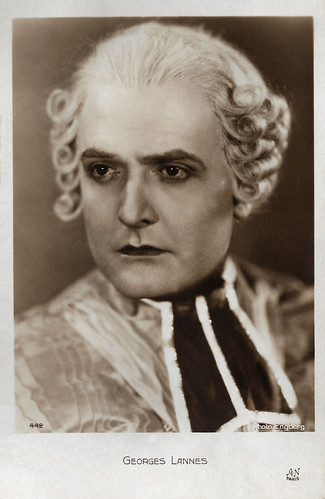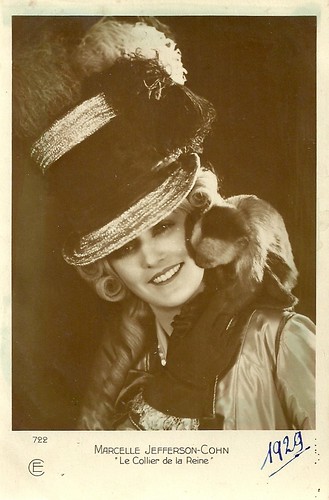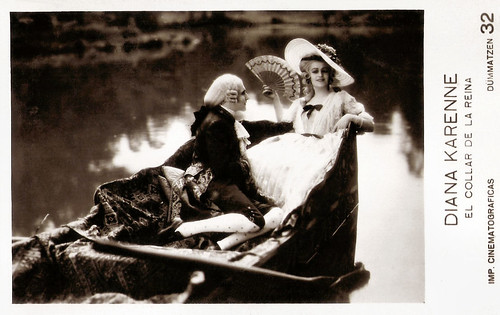
Spanish illustration by Films selectos, Supplemento Artistico. Photo: Films Artistica Barcelonesa. Diana Karenne in Le collier de la reine/The Queen's Necklace (Tony Lekain, Gaston Ravel, 1929).

Spanish illustration by Films selectos, Supplemento Artistico. Photo: Films Artistica Barcelonesa. Diana Karenne in Le collier de la reine/The Queen's Necklace (Tony Lekain, Gaston Ravel, 1929).

French postcard by A.N., Paris, no. 439. Photo: Engberg. Marcelle Chantal, aka Marcelle Jefferson-Cohn, as the Countess de la Motte in Le collier de la reine/The Queen's Necklace (Tony Lekain, Gaston Ravel, 1929).

French postcard by A.N., Paris, no. 440. Photo: Engberg. Fernand Fabre as the Count de la Motte in Le collier de la reine/The Queen's Necklace (Tony Lekain, Gaston Ravel, 1929).
The most expensive diamond necklace in the world
Pola Negri was supposed to play the plotting Comtesse de la Motte in Le collier de la reine/The Queen’s Necklace (1929). This Gaumont-Franco Film-Aubert production was a late French silent production directed by Gaston Ravel and Tony Lekain, who had also made the historical films Madame Récamier (Gaston Ravel, Tony Lekain, 1928) and starring Marie Bell, Françoise Rosay, and Edmond Van Daële, and Figaro (Gaston Ravel, 1929), a delicious adaptation of the Pierre Beaumarchais play 'The Marriage of Figaro' (1778).
When the Polish diva made a scene and refused to play, Ravel and Lekain asked their friend Marcelle Jefferson-Cohn to replace her. Marcelle had only played in one film, eight years earlier, but she said yes. It would be the start of a successful film career under the name of Marcelle Chantal. Her co-stars were former silent stars George Lannes (Cardinal de Rohan) and Diana Karenne (Marie Antoinette) and rising star Fernand Fabre (Comte de la Motte).
Le collier de la reine/The Queen's Necklace (Tony Lekain, Gaston Ravel, 1929) was shot as a silent film, but a soundtrack with music was added afterward. The film was loosely based on the novel by Alexandre Dumas, 'The Queen's Necklace', first published in serial form in 1848-1849. Dumas had been inspired by the famous 'affair of the Queen's Necklace'.
The affair of the most expensive diamond necklace in the world was an incident from 1784 to 1785 at the court of King Louis XVI of France that involved his wife, Queen Marie Antoinette. The Queen's reputation, already tarnished by gossip, was ruined by the false implication that she had participated in a crime to defraud the Crown's jewellers in acquiring the very expensive diamond necklace she then refused to pay for.
In reality, she rejected the idea of buying it only to have her signature forged by Jeanne de Valois-Saint-Rémy, also known as Jeanne de la Motte. Although Jeanne was later convicted, the event remains historically significant as one of many that led to the French disillusionment with the monarchy, in that it was one of the contemporary scandals that gave moral weight and popular support for the French Revolution.
Jeanne was a confidence trickster who made a plan to use the necklace to gain wealth and possibly power and royal patronage. A descendant of an out-of-wedlock son of Henry II of France, Jeanne had married an officer of the gendarmes, Nicholas de la Motte, the self-proclaimed "comte de la Motte". She was living on a small pension that had been granted to her by the King.
The film shows Queen Marie-Antoinette (Diana Karenne) caught up in a nefarious plot hatched by the Countess de la Motte (Marcelle Chantal aka Marcelle Jefferson-Cohn). Part of her scheme is to hire a Parisian prostitute named Olivia, who happens to be an exact double of the Queen (and who also happens to be played by Diana Karenne). The outcome of the plot hinges on a packet of forged love letters. The Cardinal of Rohan (Georges Lannes) is caught in the middle of this plot.
Some scenes of Le collier de la reine/The Queen’s Necklace (1929) were filmed at the Château de Versailles. The silent film got a musical accompaniment and one long and striking sound scene at the end which represents the whipping of a woman in public, and this is shown with the accompaniments of agonized cries and the shouting and tumult of a crowd, which enormously increase its effect. W.l. Middleton in The New York Times: "M. Ravel wisely starts with the idea of a film and not of a theatre play or a novel. His work is genuine cinema and the action goes with admirable pace and effect. He has done little violence to history, though he has strengthened the love motive beyond the warrant of the facts, a permissible liberty in romance. (...) In the film the Becky Sharp character of Jeanne comes out admirably in the acting of Marcelle Jefferson-Cohn. There is no audible dialogue throughout the greater part of the film."

French postcard by A.N., Paris, no. 441. Photo: Engberg. Jean Weber as the Chevalier Marc Rétaux de Villette Le collier de la reine/The Queen's Necklace (Gaston Ravel, Tony Lekain, 1929).

French postcard by A.N., Paris, no. 442. Photo: Engberg. Georges Lannes as the Cardinal de Rohan in Le collier de la reine/The Queen's Necklace (Tony Lekain, Gaston Ravel, 1929).

French postcard by Editions Cinémagazine, no. 722. Marcelle Chantal aka Marcelle Jefferson-Cohn in Le collier de la reine/The Queen's Necklace (Gaston Ravel, Tony Lekain, 1929).

Spanish postcard by PD / Imp. Cinematograficas Dümmatzen, no. 32. Photo: Diana Karenne in Le collier de la reine/The Queen's Necklace (Tony Lekain, Gaston Ravel, 1929).
Sources: W.I. Middleton (The New York Times), Hal Erickson (AllMovie), Wikipedia, and IMDb.
No comments:
Post a Comment